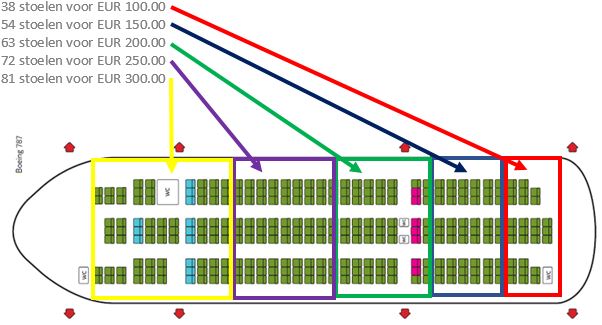How does Yield Management work at airlines?
I, Ilon Kruidhof, Business Travel Consultant at UNIGLOBE Alliance Travel, am quite often asked why one traveler pays more for a particular seat than another traveler on the same plane. There are several reasons. Below I will try to explain them.
One of the reasons is yield management. This is a strategy, which seeks to maximize the return on the capacity of an aircraft through variable pricing.
Every traveler has a ticket. The price of such a ticket can differ from each other for various reasons. Because of this, it happens, that people sit next to each other and yet pay a different price. Each class consists of several IATA class classification codes, each with its own fare.
I will give an example where I assume economy class. The aircraft consists of 150 seats. To get such a high return, the airline has allocated the seats in terms of price as follows:

In this way, the flight is profitable according to Yield Management
You have a chair for EUR 100.00. If the first 10 seats are sold, your neighbor will pay the next and higher price. If he books at the last minute, it could be, that EUR 300.00 has to be paid for the seat. It could also be that you did not meet certain conditions to get a cheaper ticket like the passenger next to you, we are talking about criteria such as:
1: Minimum stay. Airlines often use a minimum stay of 3 days and/or a weekend within Europe when setting prices. Outside Europe, this is often 5 to 7 days. The longer the stay, the lower the price. So sometimes it pays (if you want to save costs) to go one day longer even though you will have to book an extra night in a hotel. And so we also try to provide our clients with the best information.
2: Modification and/or cancellation policy. Tickets have modification and cancellation requirements. If you want a ticket that is amendable and/or cancellable, you will also often pay more than a non-amendable/cancellable ticket.
3: Prepayment period. There are also fares, especially outside of Europe, where what is known as an advanced purchase period applies. If you book far before the departure date, there is a possibility that the fare will be lower, than if you book a ticket just before departure.
Nowadays, there is then also the fact that baggage and/or seat selection must be paid for, again creating fare differences. The same rules are applied for business and possibly first class.
In addition to the above, there are several other ways to find the lowest price. For example, with our advanced systems, we can put a ticket on option and in the meantime, the system then continues to search for a better fare for you until the day of departure.
Besides, it remains human work and we have several other ways to arrive at the best proposal. Interested in learning more about this or even submitting a trial booking to us? Challenge us and contact UNIGLOBE Alliance Travel.
Did you find this blog interesting? Then be sure to follow our LinkedIn, Instagram and Facebook page to stay up to date on our blogs, business travel tips and international experiences, among other things!
Ilon Kruidhof